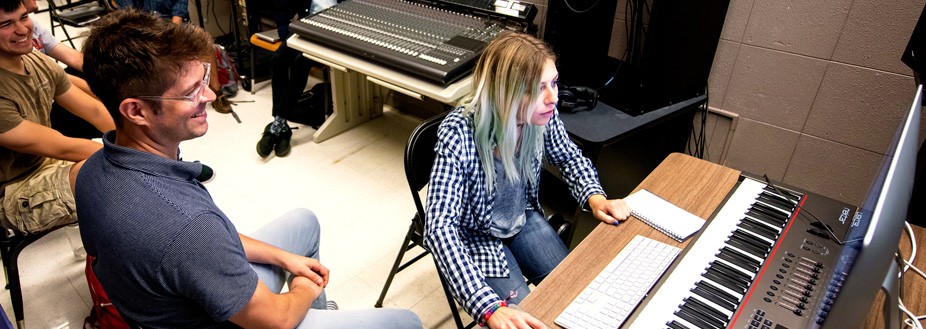Occidental began offering music production courses this year, initiating a new emphasis within the music major. According to Professor David Kasunic, chair of the music department, the program will continue to grow over the next few years and could set Occidental apart as the only liberal arts college in the country with a fully developed music production program.
According to Kasunic, the department offered Introduction to Digital Audio Workstations (MUSC 148), a new course on digital recording programs, this semester. The course teaches students to use two digital recording programs, Ableton Live and Logic Pro X, to record songs and create beats. Next semester, the department will offer Sound Design and Recording (MUSC 248) for the first time, providing students with higher-level production skills in Ableton. Kasunic said that due to overwhelming interest in MUSC 148 this semester, he will add a second section of the class next semester. Professor Daniel Wohl, a critically-acclaimed composer and producer from Paris, teaches MUSC 148 and 248.
“How we can make ourselves distinctive here is by not being just a big university with a music technology department or being a technical school that’s just offering these music production skillsets — those kinds of places exist, and they’re plentiful,” Kasunic said. “What really will set us apart is being a liberal arts college that has a full-fledged music production program.”
Kasunic said that next year his department will launch the full music production curriculum. According to Kasunic, this will include adding Mixing and Mastering (MUSC 348) as well as three new music production electives: Introduction to Songwriting (MUSC 252) and the two-unit Dramatic Scoring Intensive (MUSC 358) — tied to both the composition and production emphases — as well as Live Recording Techniques (MUSC 249), a designated production class. These three courses are awaiting the college’s approval.
“All of this is pending approval of the Academic Planning Committee, but they’ve been fully in on the loop,” Kasunic said. “The college is serious about trying to support this to the extent that they can.”
According to Kasunic, the department aims to soon add a full-time professor for the music production track.
“We’re building the program slowly, but our next ambition is to have one full-time person just devoted to music production,” Kasunic said. “I think initially it’ll be a non-tenure track full-time person. We hope to have that for next year.”
Anoop D’Souza (junior) was one of the first students to declare a music major with the music production emphasis, according to Kasunic. D’Souza said that he has played multiple instruments including piano, guitar and drums since he was 6 years old and began producing music just before arriving at Occidental. He now produces under the name DESOUZA and has accumulated over 5,000,000 plays on SoundCloud. He said that he also ghost-produces for some major artists.
According to D’Souza, Professor Adam Schoenberg noticed his talent for music production in Fall 2016. Schoenberg informed Kasunic of D’Souza’s skills, and the department sought his help in designing the new program.
“[Kasunic] would ask me questions on how they should phrase curriculum, what classes they should introduce to the school, what I thought about the new staff that they might hire,” D’Souza said.
Kasunic said that he first proposed the new music production emphasis to the administration in Spring 2014 when he became chair of the department. According to Kasunic, the idea partly stemmed from changes in prospective music majors’ backgrounds after the passage of No Child Left Behind — an education act that President George W. Bush signed into law in 2002 — caused cuts in public schools’ arts funding.
“What you don’t have, increasingly, are students coming to college who’ve had the advantage of having publicly-funded music education,” Kasunic said. “Yet, these students are as creative, as engaged and curious about music as any student before them. What they’ve done is they’ve had GarageBand, and they’ve had other ways of exploring music online.”
According to Kasunic, the new program will allow students to translate their extracurricular passion for producing, mixing tracks and songwriting into an academic experience culminating in a senior comprehensive project.
“What fuels this for all of us in the music faculty is to meet students where they are,” Kasunic said.
Brenda Jackson (first year) said that she plans to major in music and is primarily interested in songwriting. She is currently taking a course called Electronic Music (MUSC 100) and said that she hopes to take MUSC 148 next semester.
“I picked up the guitar and piano, and I just kind of learned online, self-taught. I have pretty good ears for learning things, so usually I would just listen to a song and try to figure it out,” Jackson said.
Jackson said that she believes Occidental’s location in L.A. will be beneficial to the music production program.
“Especially because we’re in L.A. — this is the place to be. I can’t imagine trying to be an electronic music production major in, like, Kansas,” Jackson said.
According to D’Souza, he would not have been able to advance his musical career so quickly if not for the opportunities in L.A.
“I don’t think I would have ever gotten as much exposure as a musician or as a producer without being here,” D’Souza said. “You do one thing here and it spreads like a wildfire.”
According to Kasunic, the combination of the college’s location and its unique liberal arts music production program is inspiring strong interest in both current and prospective students.
“It’s gonna be a game-changer in terms of what we can do at the college for students interested in music,” Kasunic said. “I’m now getting prospective students wanting to have phone conversations with me.”
![]()































